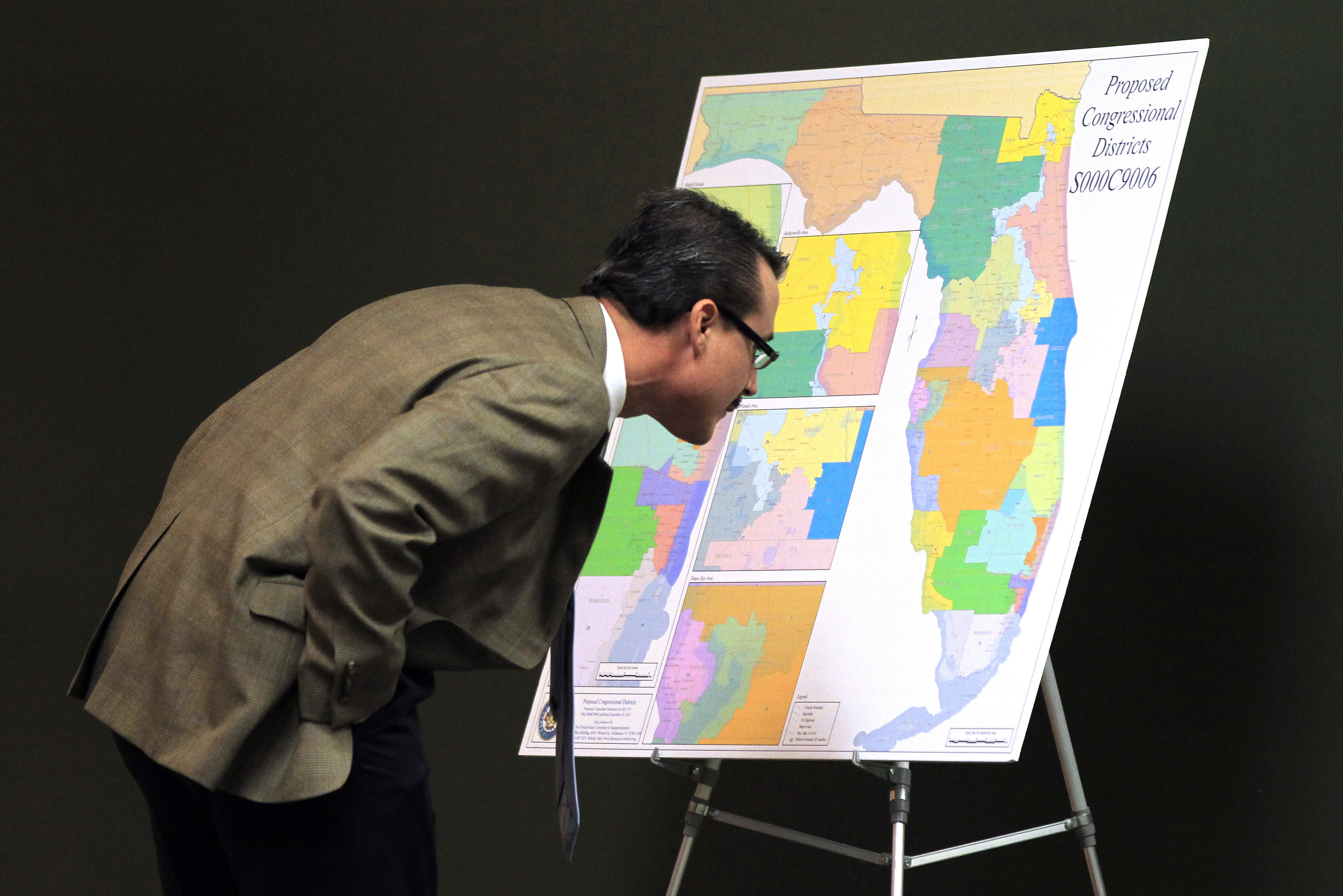By Zahnay Gates
Florida was once considered the ultimate swing state, with winners often decided within the smallest of margins, the transfer of power swinging back and forth between Democrats or Republicans. What happened? Some point to gerrymandering and its significant role in tipping the scales in favor of Republicans in recent years. By drawing district boundaries that favor their own party, Republicans have secured major wins in recent elections, even though Democrats have won a significant share of the total vote.
Gerrymandering is the practice of manipulating electoral districts to give a political party an advantage over another. In many cases, gerrymandering involves two main techniques, known as cracking and packing. Cracking spreads voters from one party across a larger number of districts while packing involves moving large numbers of voters from one party into a small number of districts. Both techniques ensure that the party in power can maintain its grip on political power, even if it does not reflect the will of the majority of voters.
Usually, voters choose their representatives, but with gerrymandering, the representatives essentially get to choose their voters.
In 2010, Floridians passed two constitutional amendments – by a 63% majority – requiring maps to be drawn without favoring incumbents or a particular political party. Known as the Fair District Amendments, their purpose was to create a fairer and more representative democracy in Florida by ensuring that all voters have an equal say in the election of their representatives and that politicians are held accountable to their constituents rather than to their own political interests. However, Republicans were caught red-handed violating these laws. In 2015, the Florida Supreme Court threw out the legislature’s proposed redistricting maps for being products of unconstitutional political gerrymandering. The historic 5-2 ruling ordered changes to eight districts, two of which were in my home of Tampa Bay.
The great lengths Republicans went to evade the Fair Districts Amendments requirements show how prevalent gerrymandering is in Florida.
Gerrymandering in Florida has led to disproportionate representation in our state legislature. As a result, several ballot initiatives have been blocked despite supermajority support by Floridians. Initiatives like Amendment 4 – which aimed to restore voting rights for millions of previously incarcerated individuals – received 65% of public support in 2018. However, in 2019 Florida’s Republican supermajority legislature passed Senate Bill 7066 (S.B. 7066), which put insurmountable hurdles in front of those with past convictions requiring them to navigate a complex court system to regain their voting rights. S.B. 7066 created a “pay-to-vote” system that prevented the goal of restoring the full rights envisioned by Amendment 4 by placing significant financial barriers on individuals unable to pay their fines and fees due to systemic poverty and economic inequality and, therefore, unable to restore their voting rights.
This is a cautionary tale for many ballot initiatives in Florida. It has become apparent to many Floridians that the agenda of our legislature does not align with the agenda of the people they are supposed to serve. Gerrymandering undermines the will of the people. If we continue to allow representatives to wield power in redistricting, representatives will continue to act in self-interest instead of in the public interest.
Recent cases heard before the United States Supreme Court have ruled that redistricting is a political question — making it unethical for the courts to judge if gerrymandering violates the Constitution. As a result, these rulings have validated representatives’ actions from both parties to continue drawing gerrymandered districts with little fear of court oversight.
In a truly democratic system, every citizen should have an equal say in the political process. However, when representatives manipulate electoral boundaries to their advantage, they take power away from the voters and use it for their own benefit. This is a serious problem, as it means that certain groups, particularly historically marginalized groups, are not being represented fairly in the political process.
As it stands, Florida Republicans have no incentive to ensure fair representation, and Democratic representatives may also be reluctant to engage in anti-partisan gerrymandering campaigning because doing so means giving up what little control they do have. Therefore, it is up to Floridians to do something about it.
One way Floridians can achieve fairer redistricting is to advocate for an independent citizen redistricting commission (IRC) citizen ballot initiative, which removes the conflict of interest that arises when politicians are responsible for drawing district boundaries. This initiative would create an independent commission of impartial citizens rather than politicians to draw district boundaries.
Here’s how Floridians can advocate for an IRC citizen ballot initiative:
Firstly, Floridians can educate themselves about gerrymandering and the benefits of an independent citizen redistricting commission. This means understanding how district boundaries are currently drawn in Florida, its impact on elections, and the potential benefits of an IRC. There are many resources available online, including reports from non-partisan organizations and news articles on the subject, that can help people understand the issue.
Secondly, Floridians can participate in the campaign to pass an IRC citizen ballot initiative. In Florida, residents have a right to propose amendments to Florida’s State Constitution through a citizen initiative petition process. This means volunteering their time to gather signatures, attending rallies and events, and spreading the word to friends and family. Grassroots movements are often the most effective way to create change, and the more people who get involved in the campaign, the greater the chance of success.
Thirdly, Floridians can contact their elected representatives to express their support for an IRC. This includes contacting their state legislators and the governor’s office. By letting representatives know they support an independent citizen redistricting commission, Floridians can help create momentum for change and hold their elected officials accountable.
A handful of states – Arizona, California, Colorado, and Michigan – have already adopted variations of independent commissions and have improved public participation, transparency, and competitive races. Designed to be a separate body from the legislature, IRCs will create a system of checks and balances and ensure that the future of Florida’s redistricting process is fair.
While the results of past citizen ballot initiatives in Florida have been subdued, this does not mean it is not worth pursuing, as the mere presence of an initiative on the ballot can have an impact. It can encourage discussion and debate around gerrymandering and pressure representatives to take action and pass legislation on their own.
Gerrymandering is a serious issue in Florida that threatens to undermine the democratic principles upon which our country was founded. With politicians manipulating electoral district boundaries to benefit their interests rather than the interests of the people they were elected to represent, it’s clear that the current system is broken. If we don’t take action to address gerrymandering in Florida, we risk creating a political system that is fundamentally unfair and unrepresentative. It’s time to stand up for democracy and demand change.

Zahnay P. Gates is an MPA-PNP student at NYU Wagner, specializing in Advocacy and Political Action. Zahnay aims to do policy work that ensures all citizens’ political, educational, social, and economic equality. She holds a BA in Criminal Justice from The University of Alabama.
Sources
Anderson, Curt. (2020, September 11). Judges: Florida felons can’t vote until they pay fines, fees. ABC27. https://www.abc27.com/news/us-world/politics/judges-florida-felons-cant-vote-until-they-pay-fines/
Associated Press. (2015, July 9). Florida Supreme Court Orders Redrawing of Districts. WSJ. https://www.wsj.com/articles/florida-supreme-court-orders-redrawing-of-districts-1436472233
Caroe, J. (2021, February 25). Affording The Franchise: Amendment 4 & The Senate Bill 7066 Litigation » Florida Law Review. Florida Law Review. http://www.floridalawreview.com/2021/affording-the-franchise-amendment-4-the-senate-bill-7066-litigation/
Constitutional Amendment 4/Felon Voting Rights – Division of Elections – Florida Department of State. (n.d.). https://dos.myflorida.com/elections/for-voters/voter-registration/constitutional-amendment-4felon-voting-rights/
Fair Districts – Common Cause Florida. (2021, February 17). Common Cause Florida. https://www.commoncause.org/florida/our-work/ensure-fair-districts-reflective-democracy/fair-districts/
Florida Department of State Division of Elections. (2017, March 16). Initiative Petition Handbook – files.floridados.gov. (n.d.). https://files.floridados.gov/media/705249/final-updated-20220124-initiative-petition-sponsoring-political-committee-user-guide.pdf
Glenn, Caroline. (2020, November 7). $15 minimum wage supporters in Florida are ‘Ready to fight’ legislation that undercuts amendment 2. Orlando Sentinel. https://www.orlandosentinel.com/politics/2020-election/os-bz-2020-minimum-wage-florida-20201106-gdfqts24kzaqdgvjai7kwbfhzu-story.html
Kirschenbaum, J., & Li, M. (n.d.). Gerrymandering Explained. Brennan Center for Justice. https://www.brennancenter.org/our-work/research-reports/gerrymandering-explained
Klas, M. E. (2019, August 25). Florida Supreme Court orders new congressional map with eight districts to be redrawn. Tampa Bay Times. https://www.tampabay.com/news/politics/stateroundup/florida-supreme-court-orders-new-congressional-map-with-eight-districts-to/2236734/
Lieb, D. A. (2019, March 21). AP: GOP won more seats in 2018 than suggested by vote share. AP NEWS. https://apnews.com/article/9fd72a4c1c5742aead977ee27815d776
Soffen, K. (2015, July 1). Independently Drawn Districts Have Proved to Be More Competitive. The New York Times. https://www.nytimes.com/2015/07/02/upshot/independently-drawn-districts-have-proved-to-be-more-competitive.html
Totenberg, N. (2019, June 27). Supreme Court Rules Partisan Gerrymandering Is Beyond The Reach Of Federal Courts. NPR. https://www.npr.org/2019/06/27/731847977/supreme-court-rules-partisan-gerrymandering-is-beyond-the-reach-of-federal-court
Wines, M. (2022, January 29). In North Carolina, a Pitched Battle Over Gerrymanders and Justices. The New York Times. https://www.nytimes.com/2022/01/29/us/north-carolina-voting-gerrymandering.html




